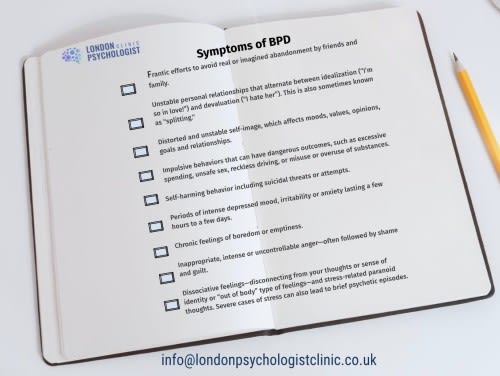Supporting a BPD sufferer

posted 22nd November 2022

What is BPD?
Borderline personality disorder is also called emotionally unstable personality disorder (EUPD) and emotional intensity disorder (EID). Around 1 in 100 people live with BPD.If you are someone living with a diagnosis of BPD, it is more likely that you will self-harm. And have challenges with relationships, alcohol or drugs. BPD can affect how an individual copes with life, manages relationships, and feels emotionally. They often find their emotions confusing, tiring, and hard to control. This can be distressing for family and friends who need to understand the condition in order to help the sufferer.
How a BPD sufferer feels:
- Lonely
- Overwhelmed by the strength of your emotions and how quickly they change
- Like there's something inherently wrong with you, and that it's your fault if bad things happen to you because you deserve them
- Like you're a bad person, or not a real person at all
- That you don't know what you want from life, or what you like or dislike
- Empty, numb or like you have no purpose
- Like your feelings are impossible to understand or describe
- Like you're a child in an adult world
- How they might behave as a result
- Self-harming or attempting suicide
- Overspending or binge eating
- Using recreational drugs, alcohol or smoking to try to cope with your emotions
- Quitting just before achieving something, or avoiding activities where you think you might fail or be disappointed
- Often changing jobs, hobbies, goals or plans
- Keeping very busy so you're never alone
- Getting very angry or frustrated with people
- Struggling to trust people
- Having unrealistic expectations of people or contacting them very frequently
- Wanting to be close to people but worrying they'll leave or reject you, and so avoiding or pushing them away
- Spending a lot of time thinking and worrying about things that other people say or do
- Asking for lots of reassurance or testing people’s commitment or opinion of you
- Distancing yourself from people or ending relationships with friends or partners because you think they might leave you
- Anxiously looking out for signs that people might reject you.
If your loved one suffers from BPD, it is important to realise that they will have an intense fear of being rejected and abandoned, so much so that if you’re five minutes late or tell them of an upcoming vacation, it may be a trigger for their anger and withdrawal. While it may seem counterintuitive, one of the best ways to communicate with someone suffering from BPD may be to acknowledge their feelings before the facts of the situation. BPD causes intense moods and mood swings, and sufferers have trouble regulating their emotions. By verifying their feelings first, you may be able to diffuse a possible volatile situation.
It is also important to avoid giving in to a BPD person’s impulsive acts. While there are extreme lows associated with BPD, there are also extreme highs, and it can be easy to get sucked in. Be careful and understand these highs are also a symptom and can plummet to a low very quickly. Here are a few basic pointers for communicating with someone with borderline personality disorder in a healthy and productive way:
- Be patient.
- Be realistic.
- Try to separate facts from feelings.
- Validate feelings first.
- Listen actively and be sympathetic.
- Seek to distract when emotions rise.
- Do not allow yourself to be the product of the intense anger; attempt to diffuse it but sometimes you may have to walk away.
- Understand the symptoms and triggers.
- Offer constructive criticism.
- Help to set realistic goals.
- Keep schedules consistent.
- Encourage treatment.
- Attend therapy together.
In managing BPD, remember to be consistent and predictable in your actions and reactions.
- Keep your word and also be honest. It is easy to go along with a tangent or rage about how awful someone or something is, but it is important to offer honest feedback since they may not even realise how their behaviour is affecting others.
- Do not take responsibility for their impulsive and irresponsible actions; do not try to save the situation or come to the rescue no matter how tempting it is. If they have wrecked their car, be supportive but encourage them to be responsible for their own actions. As difficult as it can be, keep your cool and don’t let arguments escalate.
- Being aware of the triggers for an individual with borderline personality disorder can help to avoid them and the outbursts that accompany them.
Summary for friends and relations of a BPD sufferer
- Set boundaries and don't take too much on. If you become unwell yourself you won't be able to offer as much support.
- Share your caring role with others, if you can. It's often easier to support someone if you're not doing it alone.
- Talk to someone about how you're feeling. You may want to be careful about how much information you share about the person you're supporting, but talking about your own feelings with someone you trust can help you feel supported too.
References:
NHS Website
MIND



